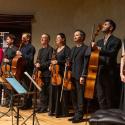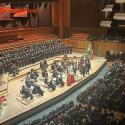When telling a complex musical story, handle with care. Interpreters need have no fear of composers who find selective, tone-friendly angles in their literary sources, like Janáček with Gogol’s Taras Bulba in last night’s searing finale, or Zemlinsky with Andersen’s The Little Mermaid, the saturated climax of the previous evening. But what about Dvořák in oddball, potentially enriching mode, setting every jot and tittle of a folk ballad without actually using words or voices? Don’t, whatever you do, chop off the arms and legs, the fate that befalls the pretty maiden of The Golden Spinning Wheel, and the action Jiři Bĕlohlávek effectively performed in cutting the tone poem by a third.
Why am I not surprised? This is the conductor, champion of wonderful repertoire as he may be, who halted the Proms antics of Stravinsky's Petrushka before the death and special ghost-appearance of the eponymous puppet (the composer himself provided an abrupt "concert ending", but no one else uses it these days). So what should Bĕlohlávek have done in this case, given that it's a long haul for an audience unfamiliar with Dvořák's unfashionable symphonic poem? Well, having taken students through what ought to be the 25-minute fairy-tale maze two days earlier, I'd say he should have given a mini-introduction with live orchestral snippets so the listeners would be comfortable with the characters and the action. But he should have had faith in the whole; otherwise, why bother?
Kadařábek's riffs on a C major scale no longer have the shock of the new-old now that we're long past the crisis of tonality rejected
Here we had no crucial scene of King asking wicked stepmother for the hand of the spinning-wheel girl he's fallen in love with, no dances at the King's wedding to the false stepsister who's taken the murdered girl's place, only two of the three forest journeys on which a mysterious old man sends a little boy to barter the amputated limbs of the girl for a golden spinning wheel and its accessories; piercing, poignant flute solos here from Michael Cox meant that one more wouldn't have outstayed its welcome. What there was galopped and gleamed in Dvořák's almost profligate invention and some of his most translucent orchestration; there was no mistaking the golden spinning wheel eerily spelling out the false bride's deceit, and the love music of the girl restored to life and reunited with her true love billowed in the Czech style Bĕlohlávek understands so well.
So it wasn't the whole story, but there was enough to make the opening caprice of Jiři Kadařábek's C, a BBC commission receiving its first performance, feel threadbare. Riffs on a C major scale no longer have the shock of the new-old now that we're long past the crisis of tonality rejected. These ones needed to sprout more of the Janáček-style tendrils promised in the opening bars. Yet despite eventual modulations, the piece soon lost the "light and airy" premise the composer laid down in his note. There's a fine line between naivety and whimsy, the childlike and the childish. Maybe it needs another chance with players who can have more fun with it than a distinctly unamused-looking BBC Symphony Orchestra.
Bĕlohlávek has a way of inscaping Janáček's insistent pattern-making in extreme registers
After the interval, we could breathe more freely. Viola wizard Maxim Rysanov honed sober concentration on the homesick introspection of Martinů's Rhapsody-Concerto. As in the previous evening's Nielsen Flute Concerto, here was the understated soul of the concert, Rysanov effortlessly focused in subtle dialogues with a very restrained orchestra, dances with woodwind turning to angst and ultimately to uneasy peace. All the hallmarks of the Czech composer's American era, as revealed at miraculous length in last season's symphonies cycle, are here - the syncopated rhythms rooted in Moravian folk music, the ambiguous harmonies, the sometimes unabashed, nostalgic recall of Dvořák (a quotation from his American Quartet twice briefly anchors the disturbances of the second movement). Rysanov unobtrusively showed us how the heart of the piece comes in the two introspective withdrawals as each movement draws to a close, even if the final quiet coda can't totally despatch the unquiet heartbeat of the side drum - a last masterstroke on this truly great composer's part.
Would Janáček's Taras Bulba, lurid snapshots of how a Cossack and his two sons meet their violent ends, seem too flashy after that? Not at all; Bĕlohlávek has a way of inscaping the insistent pattern-making in extreme registers, the hard work he's put in on sophisticated string sound paying off especially in the violins' many exposed moments. The final glorious chord progressions unfurling a brighter future for Russia - and by implication, in 1918, the newly emergent Czech nation - sounded not, as often, like credit music for a war-epic movie but yet more soul food, flipping our stomachs over as the last of the evening's three remarkable master composers always can, but so rarely does at the deeper level.














Add comment